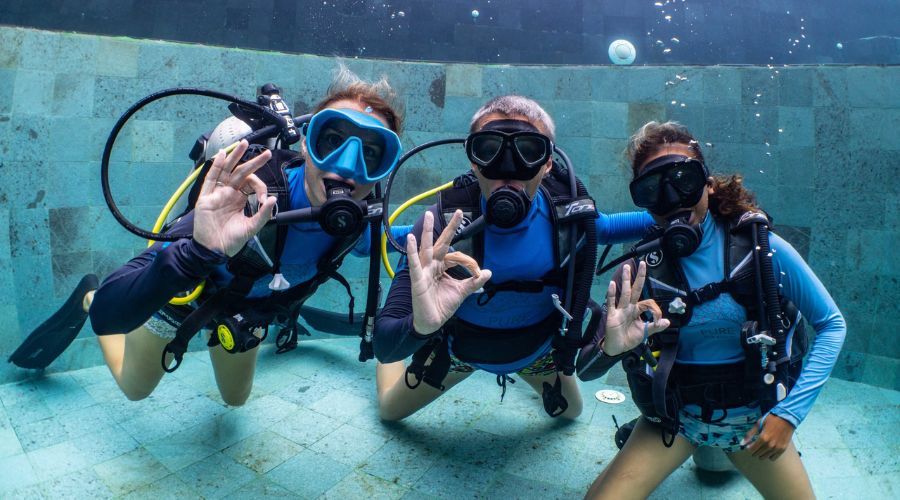Scuba Diving in Andaman: Introduction
Scuba diving in the Andaman Islands is one of the top attractions. The crystal clear waters, vibrant coral reefs and diverse marine life of the islands and the adjoining seas is mainly responsible for creating such an appealing atmosphere for scuba diving here. If you are in love with water and think you would like to spend an infinite time discovering the magic of the creatures and the underwater world that is hidden from the deep blue sea surface, scuba diving course is for you.
Suggested Read: Travel tips for Andaman and How to reach Andaman
A scuba diving course is a structured program that teaches individuals the skills, knowledge, and safety practices required to explore the underwater world using a self-contained underwater breathing apparatus (SCUBA). These courses are typically offered by certified scuba diving organizations and are conducted by professional instructors. The main goal is to ensure divers are competent, safe and comfortable underwater.
Key Components of a Scuba Diving Course
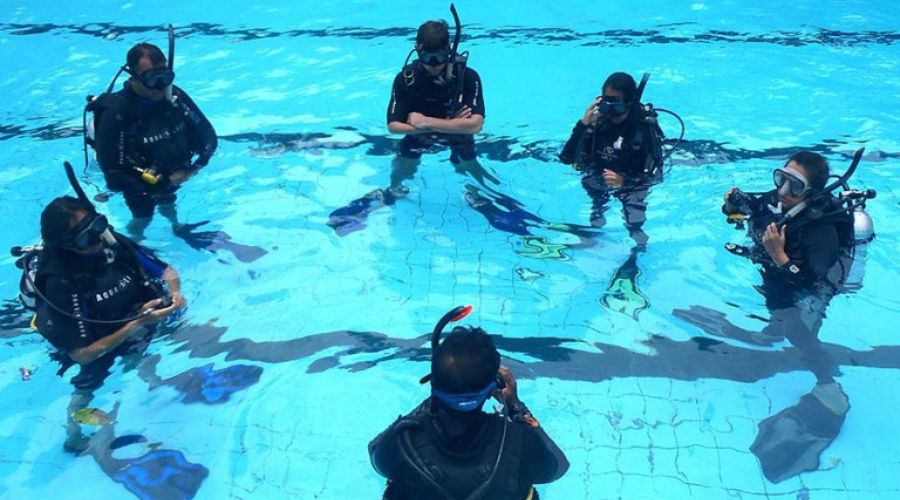
Theory Lessons
Understanding basic scuba diving concepts (e.g., pressure, buoyancy, underwater communication) is important. You need to learn the equipment use and maintenance.
The most important component is to learn about the safety procedures and emergency management.
Confined Water Dives
These dives will help you practice skills in a controlled environment, such as a pool or shallow water. The scuba diving course lessons will also teach you techniques such as mask clearing, regulator recovery and buoyancy control.
Open Water Dives
You will get the chance to apply skills in real-world conditions, such as in the ocean, a lake or some other open water environment. These dives typically includes multiple dives to ensure the diver is comfortable and confident underwater.
Certification
After successfully completing the course, participants receive a certification card (e.g., PADI Open Water Diver, SSI Open Water Diver). This certification allows you to rent equipment and participate in guided dives worldwide.
Suggested Read : Andaman tour packages
Popular Scuba Certification Agencies
- PADI (Professional Association of Diving Instructors)
- SSI (Scuba Schools International)
- NAUI (National Association of Underwater Instructors)
- BSAC (British Sub-Aqua Club)
Types of Scuba Diving Courses
- Discover Scuba Diving: Introductory session for beginners with no prior experience.
- Open Water Diver: Entry-level certification for independent diving.
- Advanced Open Water Diver: Builds on basic skills and introduces advanced techniques.
- Specialty Courses: Focus on specific types of diving like deep diving, wreck diving, or underwater photography.
- Rescue Diver: Teaches self-rescue and assisting others.
- Professional Certifications: Includes Divemaster and Instructor training.
These scuba diving courses are available in many coastal locations and tropical destinations all across the world and Andaman has a very good reputation in delivering these courses to eager learners who come from all across the globe.
Suggested Read : How to reach andaman
Why Choose Andaman for Scuba Diving
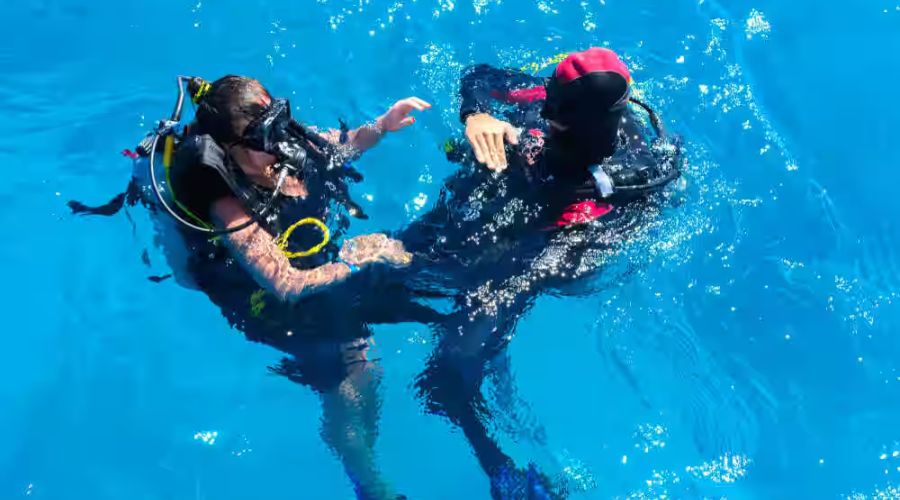
Andaman has certain important advantages over other places in managing the scuba diving courses.
Pristine Waters: Underwater visibility in the Andaman seas all around the islands is excellent, often ranging from 15 to 30 meters.
Rich Marine Biodiversity: The diversity of the underwater creatures found here is astounding. You shall be able to enjoy the chance encounters with vibrant coral reefs, sea turtles, reef sharks and a large variety of fish and other creatures.
World-Class Dive Sites: Andaman possesses some of the world’s most renowned diving sites. Dive locations like Havelock Island, Neil Island and North Bay enjoy global reputation.
Certified Dive Centres: Many international-standard dive schools operate in the region. They have a professionally managed network. They even have the ability to choose and advise or recommend the course to the first-time divers after they have guided them underwater for a usual scuba dive as a tourist. The instructors or guides who accompany the casual divers underwater have the knack of identifying diving skills in interested people.
Suggested Read : Best time to visit andaman
Types of Scuba Diving Courses in Andaman
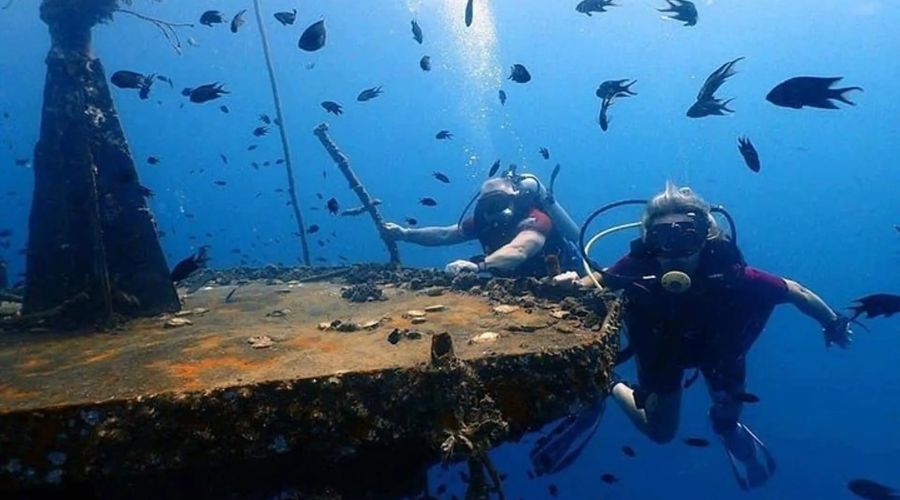
Discover Scuba Diving (DSD)
- Ideal for beginners with no prior experience.
- Includes basic theory, a shallow practice session, and a guided dive (up to 12 meters).
- Duration: Half a day.
- Certification: No certification, just an experience.
Open Water Diver (OWD)
- A globally recognized certification from PADI or SSI.
- Teaches diving skills, safety protocols, and theory.
- Dive up to 18 meters with training dives.
- Duration: 4-5 days.
Advanced Open Water Diver (AOWD)
- For certified divers wanting to dive deeper or enhance skills.
- Includes deep dives (up to 30 meters) and adventure dives like night diving or wreck diving.
- Duration: 2-3 days.
Specialty Courses
- Options include underwater photography, nitrox diving, wreck diving, and more.
- Duration: Varies based on the specialty.
Rescue Diver Course
- Focuses on safety, problem-solving, and assisting other divers.
- A prerequisite for becoming a Dive Master.
- Duration: 4-5 days.
Dive Master Certification
- Professional-level certification to guide and assist other divers.
- Involves extensive theory, practice, and dives.
- Duration: 2-4 weeks.
Suggested Read : Submarine ride in andaman
Top Diving Locations in Andaman
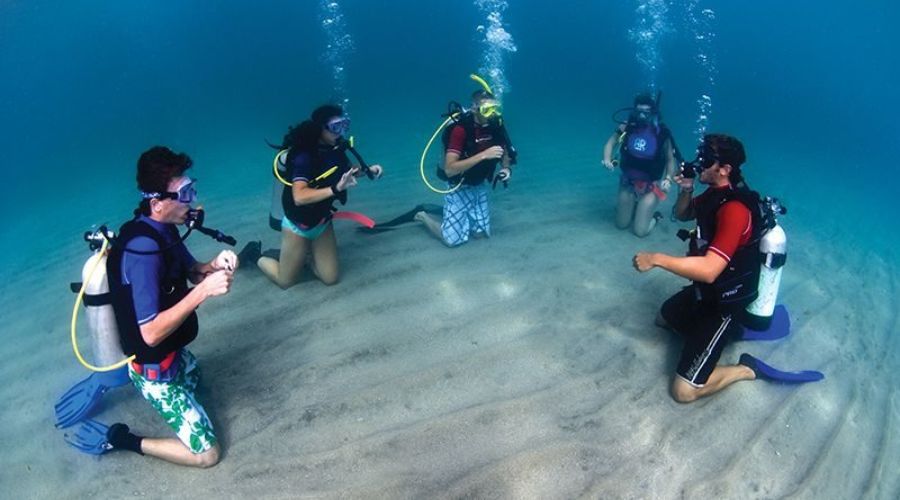
Havelock Island (Swaraj Dweep)
- Famous Sites: Elephant Beach, Neil’s Cove, Barracuda City.
- Perfect for beginners and experienced divers alike.
Neil Island (Shaheed Dweep)
- Famous Sites: Margherita’s Mischief, K Rock.
- Known for calm waters and beautiful corals.
Port Blair:
- Famous Sites: North Bay Island, Munda Pahad.
- Good for quick dives and beginners.
Barren Island:
- An advanced dive site near India’s only active volcano.
- Features dramatic underwater landscapes.
South Button Island:
- Known for shallow waters and colourful coral gardens.
- Ideal for photographers and beginners.
Suggested Read : Top rated water sports andaman
Best Dive Schools in Andaman
- Barefoot Scuba (Havelock Island): Renowned for professional instructors and facilities.
- Dive India (Havelock and Neil Island): Offers courses for all levels, including pro certifications.
- Scuba Lov (Havelock Island): Popular for small group training and safety.
- Ocean Tribe (Havelock Island): Focuses on beginner and family-friendly courses.
- Andaman Bubbles (Havelock Island): Known for its Discover Scuba Diving experiences.
What to Expect During a Course
- Day 1: Introduction to scuba gear, safety protocols, and basic underwater skills.
- Day 2-3: Practice dives in confined waters and open water dives.
- Day 4-5 (for OWD): Final certification dives and written assessment.
Pricing – Approximate – As on 2025
- Discover Scuba Diving: ₹3,500 – ₹5,000.
- Open Water Diver: ₹25,000 – ₹35,000.
- Advanced Open Water Diver: ₹20,000 – ₹30,000.
- Specialty Courses: ₹10,000 – ₹20,000.
- Dive Master Certification: ₹60,000 – ₹1,00,000.
Best Time for Scuba Diving in Andaman
- October to May: The weather is pleasant, and the waters are calm with good visibility.
- Avoid Monsoons (June-September): Strong currents and reduced visibility.
Tips for a Great Scuba Learning Experience
- Choose a Certified Dive Centre: Look for PADI or SSI certifications. They are thought to be standard and reliable. They have gained the right kind of reputation over years.
- Communicate Health Concerns: Let your instructor know about any medical conditions that might be suffering or have suffered. Let them assess your eligibility on the basis of your fitness level. Hiding vital information can prove fatal at a later stage.
- Stay Relaxed: Practice controlled breathing to enjoy the dive fully. Until and unless you are relaxed, you won’t be able to enjoy and learn fully.
- Respect Marine Life: Avoid touching corals or disturbing marine creatures. There would be a lot of dos and don’ts. So do be considerate enough to follow the practices, rules and conventions of the underwater world. They shall prove to be beneficial to you so that you are not at risk of any sort from any creature, and will prove to be useful for the marine world conservation efforts.
- Carry a GoPro or Rent One: Capture the stunning underwater world. These memories shall be your ultimate reward after having taken so much trouble in accessing the mysteries of the underwater world.
Scuba diving in the Andaman Islands is an unforgettable experience, blending adventure and the thrill of exploring a vibrant underwater ecosystem. Whether you’re a beginner or an experienced diver, the islands have something for everyone. The structure of PADI (Professional Association of Diving Instructors) and SSI (Scuba Schools International) certification courses is designed to progressively teach scuba diving skills, theory, and safety protocols, ensuring students are well-prepared to dive independently.
Let us look at roughly how these certifications are generally structured.
Suggested Read : Places to visit in port blair
Course Levels
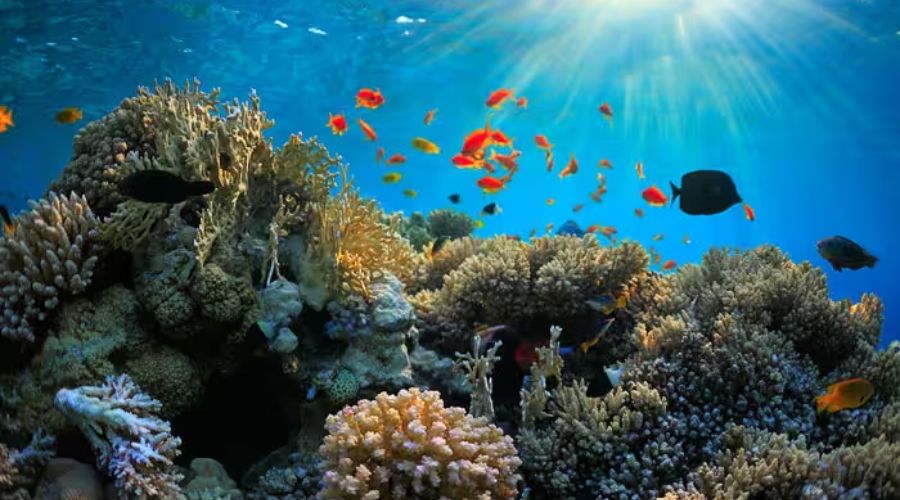
Both PADI and SSI offer similar levels of certifications:
Beginner Courses:
- Discover Scuba Diving (DSD): A non-certification introductory dive.
- Open Water Diver (OWD): The first-level certification to dive up to 18 meters.
Advanced Courses:
- Advanced Open Water Diver (AOWD): Expands skills and increases the depth limit to 30 meters.
- Specialty Certifications: Focus on areas like wreck diving, underwater photography, or nitrox diving.
Professional Courses:
- Rescue Diver: Teaches problem-solving and rescue techniques.
- Dive Master: Prepares students for leadership roles in diving.
Suggested Read : Kayaking in andaman
Course Structure
Each course includes three primary components:
Knowledge Development (Theory)
- Format: Classroom sessions, e-learning, or a combination of both.
- Topics Covered: You shall gain knowledge on basic physics and physiology of diving and dive planning and safety. You will also learn about equipment usage and maintenance along with environmental awareness.
- Assessments: Your knowledge shall be assessed at the end through quizzes and a final exam to test your level of understanding.
Confined Water Dives
- Location: A swimming pool or shallow, controlled water environment is chosen for confined water dives.
- Skills Practiced: You will learn to breath comfortably underwater. Also, get to know about equipment setup and removal. Get an idea on how to manage buoyancy control. Most importantly, they will teach you to react effectively to emergency procedures, such as mask clearing and regulator recovery.
Open Water Dives
- Location: Locations such as real dive sites like reefs or coastal waters are earmarked for the courses.
- Skills Practiced: You shall learn to apply confined water skills in open water. You will also learn navigation and buddy system diving. You will get more ideas and knowledge on depth management and safety stops.
- Requirement: A minimum number of dives, usually 4 for OWD, are needed to get to know the basics.
Duration of the Various Components of Scuba Diving Course
- Discover Scuba Diving: Half a day to 1 day.
- Open Water Diver: 3-4 days.
- Advanced Open Water Diver: 2-3 days.
- Specialty Courses: 1-2 days per specialty.
- Rescue Diver: 3-4 days.
- Dive Master: 2-4 weeks.
Suggested Read : Waterfalls in andaman
Key Differences Between PADI and SSI
Learning Style:
- PADI: Structured with fixed materials and methods.
- SSI: Flexible with adaptive materials and digital integration.
E-learning Costs:
- PADI: Requires upfront payment for materials.
- SSI: Usually free, with course fees paid later.
Certification Validity:
Both are internationally recognized and equally respected.
After Certification
There are some remarkable benefits after you attain your Scuba Diving certification, apart from enjoying the beauty of the ocean depths and cherishing the encounters with the underworld creatures. First, certified divers can rent equipment and dive with a buddy anywhere in the world. Moreover, these certifications do not expire, but refresher courses are recommended if you haven’t dived in over a year.


